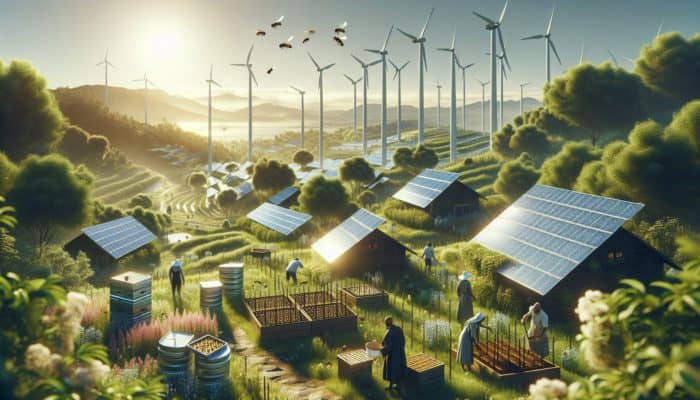Discover the Path to Fuel-Free Living for a Greener Tomorrow
What Does Living Without Fuel Entail?

The idea of living without fuel centres around the essential goal of significantly reducing or entirely removing our dependence on conventional energy sources such as petrol and diesel. This approach highlights the importance of embracing sustainable alternatives that exert minimal impact on our environment. Choosing to embark on a fuel-free journey is far from merely aspirational; it is an achievable objective that individuals and communities can actively strive to realise. By tapping into renewable energy sources and adopting eco-friendly practices, we can take substantial strides toward a more sustainable and conscientious future.
Individuals can explore various fuel-free energy alternatives, including:
- Solar energy
- Wind power
- Hydro energy
- Biomass
- Geothermal energy
- Human-powered energy (e.g., bicycles)
- Hydrogen fuel cells
- Energy storage solutions (e.g., batteries)
These alternatives not only provide critical energy but also play an essential role in diminishing greenhouse gas emissions and improving energy security. Transitioning to a fuel-free lifestyle demands dedication and creativity; however, the ultimate reward is a more sustainable way of living that benefits our planet and all its inhabitants.
Uncover the Advantages of Embracing a Fuel-Free Lifestyle
Embracing a fuel-free lifestyle offers a multitude of benefits that extend beyond individual choices, highlighting our shared responsibility towards the planet. At the heart of these benefits lies environmental sustainability, as decreasing our reliance on fossil fuels leads to a notable reduction in carbon emissions. This transformation is pivotal in combating climate change, safeguarding ecosystems, and preserving biodiversity for generations to come.
In addition to environmental benefits, the health advantages associated with fuel-free living are significant. Enhanced air quality and diminished pollutants contribute to improved respiratory health and overall wellness. Communities that adopt fuel-free practices often enjoy an elevated quality of life, characterised by increased green spaces and reduced traffic congestion. Economically, shifting towards sustainable methods can result in lower energy costs and job creation within the renewable energy sector. This not only revitalises local economies but also fosters a sense of community pride and shared values among residents.
Identify and Tackle the Challenges of Fuel-Free Living
Although the pursuit of a fuel-free lifestyle is promising, it comes with its share of hurdles. Common challenges include high upfront costs, insufficient infrastructure, and a general reluctance to embrace change. Many individuals and communities may feel daunted by the financial implications of investing in renewable technologies. However, innovative solutions are available to effectively confront these challenges.
For instance, community solar projects enable individuals to pool resources for solar energy investments, significantly lowering costs while promoting local energy independence. Awareness and educational campaigns are crucial for overcoming resistance, showcasing the long-term benefits of sustainable practices. Additionally, government incentives and grants can ease the financial burden, encouraging wider adoption of fuel-free living. By proactively addressing these challenges with comprehensive strategies, communities can successfully navigate the journey towards a fuel-free future.
Insights from Experts on Embracing Fuel-Free Living

How Do Experts Define a Fuel-Free Society?
Experts define a fuel-free society as one that primarily relies on renewable energy sources and sustainable living practices. This vision encompasses both energy generation and resource consumption, prioritising efficiency and sustainability across all areas of life. Numerous real-world examples illustrate communities that have successfully transitioned to fuel-free living.
Take Freiburg, Germany, for example, often recognised as a model for sustainable urban development. This city has enacted stringent policies that promote the use of solar energy, public transport, and cycling, resulting in a significant reduction in its carbon footprint. Similarly, cities like San Francisco have implemented comprehensive plans aimed at achieving zero emissions, focusing on renewable resources and energy efficiency. These instances demonstrate that through collaboration, creativity, and unwavering commitment, communities can effectively adopt a fuel-free lifestyle.
What Technologies Are Essential for Fuel-Free Living?
The fundamental technologies that facilitate fuel-free living include solar panels, wind turbines, and electric vehicles. These innovations are vital for reducing our dependence on fossil fuels and enabling a sustainable lifestyle. Individuals can take proactive measures to incorporate these technologies into their everyday lives.
To begin with, investing in solar panels offers a dependable and renewable energy source for households, lowering electricity costs while decreasing reliance on grid power. Wind turbines can be particularly effective in rural regions, depending on their location. Furthermore, adopting electric vehicles can significantly reduce individual carbon footprints, especially when powered by renewable energy sources. Engaging with local renewable energy initiatives and businesses can simplify these transitions, encouraging community involvement and participation.
What Role Do Experts Play in Advancing Fuel-Free Living?

Experts play a pivotal role in advocating for fuel-free living by educating the public and influencing policies that support sustainable practices. Their expertise is crucial for guiding individuals and communities toward effective solutions, and their research underscores the urgent need to transition to a fuel-free lifestyle.
Through research and the dissemination of knowledge, experts clarify renewable technologies and underscore their benefits. They frequently collaborate with policymakers to devise strategies that incentivise renewable energy adoption while discouraging fossil fuel consumption. This comprehensive approach ensures that communities are well-equipped with the knowledge and resources necessary for a successful transition to a fuel-free lifestyle.
What Challenges Do Communities Face When Transitioning to Fuel-Free Living?
Communities face various challenges in their quest for fuel-free living, such as initial costs, infrastructural deficiencies, and cultural resistance. The high costs associated with renewable technologies can deter individuals from making the switch, particularly as many perceive these investments as financially burdensome without immediate returns.
Infrastructure development presents another substantial hurdle. Numerous regions lack the essential support systems for implementing renewable energy, such as electric vehicle charging stations or efficient public transport systems. Additionally, sociocultural resistance may hinder progress; communities might hesitate to adopt change due to complacency or scepticism regarding new technologies.
To overcome these obstacles, communities can launch educational campaigns that illustrate the long-term savings and environmental benefits of transitioning to fuel-free living. Collaborative ventures that share costs and resources, like community solar gardens or local wind farms, can alleviate financial concerns while fostering a sense of unity and collective responsibility among residents.
Practical Strategies for Transitioning to a Fuel-Free Lifestyle
How Can You Begin Reducing Your Fuel Dependency?
Embarking on the journey to lessen fuel dependency can start with small, manageable changes that lay the foundation for a more sustainable lifestyle. Every effort counts, and initiating change with minor steps can lead to significant transformations over time. Here are some actionable measures that individuals can implement to commence their transition towards a fuel-free life:
- Utilise public transport whenever possible
- Carpool with friends or colleagues
- Incorporate walking or cycling into daily activities
- Invest in energy-efficient appliances
- Educate yourself about renewable energy options available in your area
- Reduce energy consumption by adopting mindful habits
- Engage in local sustainability initiatives
- Support businesses that prioritise eco-friendly practices
By concentrating on these actionable steps, individuals can progressively diminish their reliance on fossil fuels while contributing to a broader cultural shift towards sustainability.
What Are the Most Effective Home Energy Solutions?
Implementing effective home energy solutions is vital for reducing fuel consumption and enhancing energy efficiency. Embracing technologies such as solar water heaters and energy-efficient appliances can lead to substantial reductions in energy use and lessen reliance on nonrenewable energy sources.
For instance, solar water heaters harness sunlight to provide hot water, significantly lowering electricity expenses while cutting down carbon emissions. Energy-efficient appliances, such as those certified by ENERGY STAR, utilise less energy while performing at the same level, making them a wise investment for any household. Moreover, the introduction of smart home technologies can optimise energy usage by enabling homeowners to monitor and manage their consumption effectively.
Furthermore, simple modifications like improving insulation and sealing air leaks can considerably reduce heating and cooling demands, contributing to a more energy-efficient home. By investing in these solutions, individuals not only lessen their fuel dependency but also cultivate a more comfortable and sustainable living environment.
What Role Does Community Involvement Play in Fuel-Free Living?
Community engagement is crucial for the successful adoption of a fuel-free lifestyle. When individuals unite, their collective efforts can amplify the impact and resonate throughout the community. Community involvement nurtures a sense of shared responsibility and encourages individuals to adopt sustainable practices together.
Local initiatives, such as community gardens or neighbourhood solar energy projects, can enhance collaboration and resource-sharing. These projects not only promote fuel-free living but also strengthen community bonds and establish a supportive network for individuals committed to sustainability. Additionally, organising workshops and educational events focused on renewable energy can empower community members with the knowledge necessary to make informed decisions.
By promoting collective action and fostering dialogue about sustainable practices, communities can drive significant change towards a fuel-free future, transforming individual efforts into a powerful movement for environmental stewardship.
The Influence of Fuel-Free Living on Everyday Life
How Does a Fuel-Free Lifestyle Transform Your Daily Routine?
Adopting a fuel-free lifestyle can dramatically alter daily routines, encouraging individuals to embrace alternative modes of transportation and lifestyle choices. This transition often fosters a renewed appreciation for physical activity and a deeper connection to the environment. For instance, opting to walk or cycle instead of driving not only reduces fuel dependence but also promotes a healthier way of living.
Commutes may become more enjoyable as individuals shift to biking or utilising public transport, enhancing social interactions and reducing stress levels. Moreover, consolidating daily errands into fewer trips minimises overall travel, leading to more efficient energy use. These changes frequently result in increased awareness of one's surroundings, fostering a deeper connection to the local community and environment.
Furthermore, as individuals engage more in community sustainability efforts, they may participate in local events or initiatives, enriching their daily experiences and broadening their social networks. Consequently, fuel-free living acts as a catalyst for a holistic approach to life, encompassing health, environmental consciousness, and community engagement.
What Health Benefits Are Associated with a Fuel-Free Lifestyle?
The health benefits linked to a fuel-free lifestyle are extensive and significantly impact both physical and mental well-being. Cleaner air resulting from reduced dependence on fossil fuels leads to fewer respiratory issues and improved overall health. Residing in areas characterised by lower pollution levels allows individuals to enjoy better respiratory function and reduced incidence of asthma and other pulmonary diseases.
Additionally, the shift towards more active modes of transportation, such as walking or cycling, promotes physical fitness and mitigates the risk of obesity and related health conditions. Engaging with nature through outdoor activities becomes increasingly prevalent in fuel-free communities, enhancing mental well-being and alleviating stress levels.
Moreover, the social dimensions of fuel-free living contribute to better health outcomes. Increased community interaction and support networks can lead to improved mental health and a sense of belonging. Ultimately, a fuel-free lifestyle promotes a holistic approach to health, emphasising the interconnectedness of environmental sustainability, physical activity, and community well-being.
How Does Fuel-Free Living Affect Your Financial Budget?
Transitioning to a fuel-free lifestyle can positively impact your financial budget by lowering energy costs and eliminating fuel expenses. The shift to renewable energy sources and energy-efficient practices often results in substantial long-term savings. By investing in solar energy or utilising energy-efficient appliances, households can significantly decrease their monthly utility bills.
Eliminating gasoline expenses by opting for public transport, biking, or walking not only saves money but also reduces wear and tear on vehicles, extending their lifespan and minimising repair costs. Furthermore, an increasing number of fuel-free technologies are becoming more affordable and accessible, leading to a quicker return on investment.
Moreover, adopting a more sustainable lifestyle often encourages mindful consumption habits, leading to reduced waste and fewer unnecessary purchases. By prioritising renewable energy and efficiency, individuals can enjoy significant financial benefits while contributing to a sustainable future. In essence, a fuel-free lifestyle can enhance economic resilience and financial freedom for individuals and families alike.
Evidence-Based Benefits of Embracing a Fuel-Free Lifestyle
What Do Research Studies Reveal About Environmental Impact?
Research consistently demonstrates that fuel-free living significantly reduces carbon emissions and other pollutants. Studies indicate that communities integrating renewable energy sources can achieve substantial reductions in greenhouse gas emissions, resulting in improved air quality and enhanced environmental health.
Moreover, transitioning to a fuel-free lifestyle can create a ripple effect on global carbon footprints. For instance, cities that adopt electric public transport can drastically lower their emissions, illustrating the potential for widespread environmental benefits. Research also suggests that communities focused on renewable energy initiatives often experience increased biodiversity, as the reduction in pollution and habitat destruction allows ecosystems to flourish.
The environmental advantages of living fuel-free transcend individual actions; they embody a collective responsibility towards our planet. By prioritising sustainable practices and renewable energy, communities can contribute to global efforts to combat climate change, protect ecosystems, and preserve natural resources for future generations.
How Does Fuel-Free Living Promote Economic Development?
Fuel-free living has the potential to stimulate economic growth by generating jobs within renewable energy sectors and fostering local economies. The transition to sustainable energy sources not only decreases dependence on fossil fuels but also opens new avenues for employment and innovation. The renewable energy industry has witnessed rapid expansion, presenting numerous career opportunities in solar panel installation, wind turbine maintenance, and energy efficiency consulting.
Communities that embrace fuel-free living often attract investments and foster innovation, as businesses increasingly align with sustainable practices. This can lead to the emergence of local industries centred on renewable technologies, enhancing economic resilience. Additionally, the cost savings associated with lower energy bills allow consumers to redirect funds towards local enterprises, further stimulating economic activities within the community.
Ultimately, fuel-free living not only addresses environmental challenges but also presents a robust opportunity for economic revitalisation. By prioritising sustainability, communities can create jobs, encourage innovation, and invigorate local economies, achieving a beneficial outcome for both the environment and the economy.
What Social Advantages Come with a Fuel-Free Society?
A fuel-free society has the potential to enhance social equity by ensuring access to clean energy for everyone, fostering an inclusive environment where all individuals benefit from sustainable practices. Access to renewable energy sources can alleviate energy poverty, ensuring that marginalised communities have reliable energy without the financial burden associated with fossil fuels.
Moreover, communities that adopt fuel-free living typically prioritise public spaces, promoting social interaction and community bonding. By investing in pedestrian-friendly infrastructure and accessible public transport, these neighbourhoods create environments that encourage connections among residents, thereby enhancing social cohesion.
Real-world examples highlight the social improvements resulting from fuel-free initiatives. For instance, neighbourhoods that have embraced cycling infrastructure report increased community engagement and lower crime rates. Furthermore, fuel-free living often promotes shared resources, strengthening community ties and encouraging collective action towards common goals.
Ultimately, a fuel-free society fosters social equity and inclusion, creating environments where all individuals can thrive and reap the benefits of transitioning to sustainable practices.
How Does Living Without Fuel Enhance Personal Health?
Living without fuel can significantly improve personal health by enhancing air quality and reducing exposure to pollutants. Research indicates that communities transitioning to renewable energy sources experience lower rates of respiratory issues and other health conditions linked to air pollution.
The reduction of fossil fuel consumption results in fewer harmful emissions, creating healthier living environments. Additionally, adopting a fuel-free lifestyle frequently encourages physical activity through walking, cycling, and outdoor engagement, contributing to overall well-being.
Studies consistently highlight a correlation between reduced pollution levels and improved health outcomes. Communities that prioritise fuel-free living report better mental health, increased physical fitness, and lower incidences of chronic diseases. By prioritising health, individuals can benefit from the numerous advantages associated with a cleaner, more sustainable lifestyle.
Innovative Technologies Paving the Way for Fuel-Free Living
What Are the Latest Advancements in Renewable Energy?
Recent advancements in renewable energy technology are transforming our approach to fuel-free living. Innovations such as more efficient solar panels and cutting-edge wind turbine designs are redefining the future of energy generation. These developments not only enhance energy output but also lower the overall cost of renewable technologies, making them more accessible to households and communities alike.
For example, bifacial solar panels can capture sunlight on both sides, significantly boosting energy generation efficiency. Similarly, vertical-axis wind turbines are gaining popularity in urban settings, offering a compact and efficient method for harnessing wind energy. These technologies are purposefully designed to optimise energy production while minimising environmental impact.
Additionally, advancements in energy storage solutions, such as lithium-ion batteries, are enabling the effective integration of renewable energy into everyday life. As these technologies continue to evolve, they pave the way for a more sustainable future, enhancing our capability to harness nature's power while reducing dependency on fossil fuels.
How Do Smart Grids Enhance Fuel-Free Living?
Smart grids play a crucial role in optimising energy distribution and usage, significantly improving the efficiency of fuel-free living. These advanced energy systems employ digital technology to monitor and manage energy flow, ensuring that renewable resources are utilised effectively while minimising waste.
By integrating renewable energy sources into the grid, smart grids can balance supply and demand in real-time, simplifying reliance on clean energy for individuals. This technology facilitates the efficient management of distributed energy resources, such as solar panels and wind turbines, allowing households to generate and consume energy more effectively.
Moreover, smart grids can engage consumers through energy management applications, empowering individuals to track their energy usage and make informed decisions. By promoting transparency and encouraging energy-saving behaviours, smart grids contribute to a more sustainable energy landscape, supporting the transition towards a fuel-free society.
What Significance Do Electric Vehicles Hold in Fuel-Free Living?
Electric vehicles (EVs) are fundamental to fuel-free living, significantly reducing reliance on fossil fuels and contributing to lower emissions. The adoption of EVs not only diminishes personal carbon footprints but also enhances air quality in urban areas. As battery technology advances, EVs are becoming more efficient and affordable, establishing them as a viable choice for consumers across the globe.
The benefits of electric vehicles extend beyond individual use. They can be charged using renewable energy sources, further amplifying their environmental advantages. Moreover, the widespread adoption of EVs can stimulate local economies, creating new jobs in manufacturing, installation, and maintenance of charging infrastructure.
In summary, electric vehicles represent a vital component of fuel-free living. By transitioning to EVs, individuals can enjoy a sustainable mode of transportation while contributing to a cleaner, healthier environment. Here are some notable benefits of electric vehicles:
- Reduced greenhouse gas emissions
- Lower operating costs
- Enhanced energy efficiency
- Improved air quality
- Access to renewable energy charging options
- Potential for government incentives and rebates
- Contribution to energy independence
- Promotion of sustainable urban development
Overcoming Challenges in Fuel-Free Living
What Are Common Barriers to Embracing a Fuel-Free Lifestyle?
Common barriers to adopting a fuel-free lifestyle include initial costs, insufficient infrastructure, and resistance to change. High upfront costs associated with renewable technologies can deter individuals from making the switch, particularly in regions where fossil fuels remain more economical.
Infrastructure limitations present another significant challenge. Many communities lack the necessary support systems for renewable energy integration, such as electric vehicle charging stations or reliable public transport options. Moreover, sociocultural resistance often arises from apprehension about new technologies or a lack of awareness regarding their benefits.
Addressing these barriers requires a multifaceted approach. Educating the public about the long-term savings and environmental advantages of transitioning to fuel-free living is crucial. Governments and organisations can implement incentives, subsidies, and community projects that distribute costs, making renewable technologies more accessible and appealing to the population.
How Can Policy Changes Support the Transition to Fuel-Free Living?
Policy changes can significantly influence the promotion of fuel-free living by incentivising the adoption of renewable energy and regulating fossil fuel consumption. Governments can formulate policies that encourage the development of clean energy, such as tax credits for solar panel installations or grants for energy-efficient home upgrades.
Additionally, implementing regulations that limit emissions and promote sustainable practices can compel communities to embrace fuel-free living. For instance, cities can enact zoning laws favouring renewable energy projects, facilitating the establishment of solar farms or wind energy installations.
Furthermore, public transport initiatives can be enhanced through funding and policy support, improving accessibility and reducing dependence on personal vehicles. By fostering a favourable policy environment for clean energy, governments can empower individuals and communities to transition seamlessly and effectively to sustainable living.
What Psychological Barriers Exist in Fuel-Free Living?
Psychological barriers, such as fear of change and lack of awareness, can hinder the adoption of fuel-free living. Many individuals may feel overwhelmed by the prospect of transitioning to renewable energy or embracing new technologies, leading to reluctance and inertia.
Addressing these mental hurdles necessitates targeted education and awareness campaigns that emphasise the benefits of fuel-free living. Sharing relatable success stories and real-world examples can help individuals visualise the positive impact of their choices. Fostering a culture of sustainability through community engagement and support can motivate individuals to embrace change, making the transition feel less intimidating.
Creating networks for individuals pursuing similar goals also helps alleviate fears and fosters a sense of belonging within the movement. By tackling psychological barriers through education, support, and community involvement, the shift towards a fuel-free lifestyle can become more approachable and appealing.
Reliable Strategies for Fuel-Free Living
How Can You Develop a Personal Fuel-Free Plan?
Creating a personal fuel-free plan involves evaluating your energy needs and identifying sustainable alternatives that align with your lifestyle. The initial step is to assess your energy consumption habits, pinpointing areas where you can reduce reliance on fossil fuels.
Next, investigate available renewable energy sources in your area, such as solar or wind energy. Establishing a timeline for gradual implementation can help make the process manageable, enabling you to transition to fuel-free living at a comfortable pace.
Consider incorporating energy-efficient appliances, using public transport, or adopting cycling as a primary mode of transportation. Engaging with local sustainability initiatives can further support your efforts, as community resources can provide invaluable information and assistance. By crafting a personal fuel-free plan, you can actively take steps towards a more sustainable lifestyle while contributing to a collective movement for positive change.
What Are Effective Strategies for Minimising Energy Consumption?
Effective strategies for minimising energy consumption encompass various practices that enhance efficiency and sustainability. Conducting energy audits is a vital first step, enabling individuals to identify areas for improvement within their homes and lifestyles.
Investing in energy-efficient appliances, such as LED lighting and ENERGY STAR-rated devices, can lead to significant savings on utility bills. Additionally, adopting energy-saving behaviours—like turning off lights when not in use and unplugging devices—can further minimise consumption.
Incorporating smart home technologies, such as programmable thermostats, can optimise energy usage and promote mindfulness regarding consumption patterns. By integrating these strategies, individuals can effectively reduce their energy footprint while contributing to a culture of sustainability.
How Can You Motivate Others to Embrace Fuel-Free Living?
Engaging others in the pursuit of fuel-free living can be achieved through education, community events, and leading by example. Hosting workshops that inform individuals about renewable energy options and sustainable practices can spark interest and motivation among community members.
Organising local sustainability initiatives, such as community clean-ups or tree-planting events, fosters collaboration and encourages individuals to take ownership of their environmental impact. Utilising social media platforms as powerful tools to share insights, success stories, and resources can also inspire others to join the fuel-free movement.
Leading by example is perhaps the most effective way to engage others. When individuals witness the benefits of a fuel-free lifestyle firsthand, they are more likely to feel inspired and take action themselves. By creating a supportive environment and fostering dialogue, you can effectively involve others in the quest for a more sustainable future.
The Future of Fuel-Free Living
What Trends Are Shaping the Future of Fuel-Free Living?
Trends influencing the future of fuel-free living include the increased adoption of renewable energy, smarter technology integration, and more sustainable transportation options. As awareness of climate change and environmental challenges grows, individuals and communities are increasingly seeking eco-friendly solutions.
The integration of smart home technologies allows individuals to monitor and manage their energy usage more effectively, resulting in greater efficiency and reduced consumption. Furthermore, the rise of electric vehicles is transforming transportation, making it easier for individuals to move away from fossil fuel dependence.
Moreover, community-driven initiatives focusing on sustainability are gaining momentum, as collaboration fosters a sense of shared responsibility and collective action. Collectively, these trends signal a significant shift towards a more sustainable future, as societies prioritise environmentally conscious practices in their daily lives.
How Will Fuel-Free Living Evolve in the Coming Decades?
Fuel-free living is expected to undergo significant evolution in the coming decades as technological advancements and heightened public awareness drive change. Innovations in renewable energy production, energy storage, and smart grid technology will revolutionise the way individuals and communities generate and consume energy.
As societies become increasingly interconnected, sharing resources and knowledge through digital platforms will facilitate greater collaboration and innovation. Emerging technologies, such as hydrogen fuel cells and advanced battery solutions, will further enhance the feasibility of fuel-free living, making it an increasingly attractive option for individuals around the globe.
Furthermore, public policy is anticipated to evolve in response to the growing demand for sustainable practices, promoting incentives and infrastructure that support the transition to a fuel-free future. This evolution will ultimately contribute to a shift in cultural norms, where fuel-free living becomes an integral part of everyday life rather than a niche choice.
What Are the Long-Term Aspirations of a Fuel-Free Society?
The long-term aspirations of a fuel-free society encompass achieving energy independence, minimising carbon footprints, and fostering a sustainable future for all. These objectives underscore the urgency of moving away from fossil fuels and embracing renewable energy sources that can meet the needs of both current and future generations.
A fuel-free society aims to enhance environmental resilience by preserving ecosystems, promoting biodiversity, and mitigating climate change. By prioritising renewable energy and sustainable practices, communities can work towards achieving a balanced relationship with the environment.
Additionally, social equity and inclusivity remain central aspirations, ensuring that all individuals have access to clean energy and the advantages of a sustainable lifestyle. By focusing on these long-term objectives, societies can collectively strive for a future that prioritises the well-being of both people and the planet.
Frequently Asked Questions
What Are the Key Benefits of Living Without Fuel?
Living without fuel dramatically reduces carbon emissions, enhances air quality, bolsters energy independence, and fosters community engagement. It results in improved health outcomes and can lead to substantial savings on energy bills.
How Can Individuals Begin Transitioning to a Fuel-Free Lifestyle?
Individuals can initiate the transition by implementing small changes, such as using public transport, cycling, or walking. Investing in energy-efficient appliances and renewable energy sources like solar power can also ease the transition.
What Role Do Communities Play in Fuel-Free Living?
Communities promote collective action and support for sustainable practices, creating initiatives that encourage renewable energy, public transport, and community involvement, thereby amplifying individual efforts towards fuel-free living.
What Psychological Barriers Exist in Adopting a Fuel-Free Lifestyle?
Psychological barriers include fear of change, lack of awareness, and resistance to new technologies. Addressing these challenges requires education, support, and fostering a culture of sustainability within communities.
How Can Policy Changes Facilitate Fuel-Free Living?
Policy changes can incentivise renewable energy use, support infrastructure development, and regulate fossil fuel consumption, creating a favourable environment for individuals and communities to adopt sustainable practices.
What Are the Essential Technologies for Fuel-Free Living?
Essential technologies include solar panels, wind turbines, electric vehicles, and energy storage solutions. These innovations enable individuals to reduce reliance on fossil fuels and embrace renewable energy sources.
What Are Effective Home Energy Solutions?
Effective home energy solutions encompass solar water heaters, energy-efficient appliances, smart home technologies, and improved insulation, all contributing to reduced energy consumption and enhanced sustainability.
What Health Benefits Are Associated with a Fuel-Free Lifestyle?
A fuel-free lifestyle leads to improved air quality, reduced exposure to pollutants, enhanced physical fitness, and better mental well-being, contributing to overall health improvements.
How Does Living Without Fuel Contribute to Economic Growth?
Fuel-free living stimulates economic growth by creating jobs in renewable energy sectors, reducing energy costs, and fostering local economies through sustainable practices and innovations.
What Are the Long-Term Aspirations of a Fuel-Free Society?
Long-term aspirations of a fuel-free society include achieving energy independence, reducing carbon footprints, fostering social equity, and creating a sustainable future that benefits both people and the planet.
Discover our world on X!
The post Surviving Without Fuel: Essential Strategies appeared first on Survival Bite.
The Article Essential Strategies for Surviving Without Fuel Was Found On https://limitsofstrategy.com

